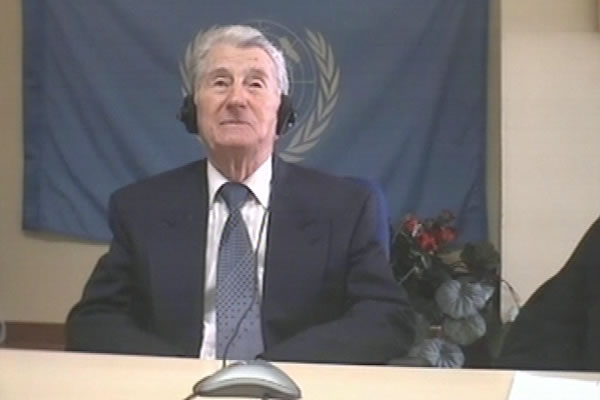Home
‘COLLATERAL DAMAGE’ IN SANSKI MOST
Retired colonel Branko Basara said that civilians – women and children – were killed in the VRS attacks on the villages of Mahala and Hrustovo because they ‘didn’t leave when the army allowed them to’. ‘Those that remained knew they could end up getting killed, and only those who wanted to fight remained’, Basara explained, adding that civilian killed in NATO air strikes were declared ‘collateral damage’
 Branko Basara, defence witness at Rako Mladic trial
Branko Basara, defence witness at Rako Mladic trial In his testimony in Ratko Mladic’s defense, retired colonel Branko Basara said that the 6th Krajina Brigade took part in the drive to disarm the people in several villages near Sanski Most, including Mahala and Hrustovo. In late May 1992, some of the crimes listed in the indictment against the former commander of the VRS Main Staff were committed at those locations. The witness commanded the brigade in 1992.
The village of Mahala was attacked on 26 May 1992 in response to mortars firing from the village, Basara claimed. Several civilians were killed in the VRS attack. Basara claimed that he had given three hours to all those who did not want to fight to leave the village. ‘Those who remained knew they could end up getting killed and only those who wanted to fight remained’, Basara explained. The prosecutor insisted that a group of women and children were killed in a basement in the village of Hrustovo on 31 May 1992. When he was asked if he agreed that 'some civilians were killed in the attack’, the witness replied that ‘those who refused to evacuate’ were killed. Basara argued that civilians were killed in NATO air strikes too, but those victims were called ‘collateral damage’.
According to Basara, the police and the Territorial Defense did not assist his forces when they went into villages to disarm the population. This claim is contradicted by the documents he was shown by the prosecution. Everyone was ‘doing their job’ and the various forces and agencies cooperated only at the level of ‘intelligence collection’, Basara said. The prosecutor noted that Momir Talic, commander of the 1st Krajina Corps, was the first to order the 6th Krajina Brigade to coordinate its activities with the civilian bodies. In September 1992, Ratko Mladic issued a similar order, instructing his troops to ‘provide maximum assistance to the civilian authorities and the Interior Ministry’, the prosecutor stressed.
Speaking about the crime at the Vrhpolje bridge,Basara said he didn’t know who the perpetrators were. They ran away when they heard ‘the colonel was coming’, Basara explained.
Basara was told that the victims had been ordered to jump from the bridge and then they were fired at from automatic weapons. Two of his soldiers were near the bridge, Basara said, and they claimed they had not taken any part in the crime. When Basara saw their weapons were slung from their right shoulders, he concluded that their claim was true. According to Basara, the crime was never investigated because he ‘didn’t have the time or the expert bodies to carry out an investigation’. A criminal investigation would have taken up 90 per cent of his time and he would have had to ‘set other things aside’, Basara said.
The prosecutor put it to the witness that the events in Mahala and Hrustovo and the incident at the Vrhpolje bridge prompted him to issue an order in early June 1992 ‘prohibiting genocide against women and children’. Basara agreed that the events ‘did play a certain role’ but his soldiers were not responsible for the incidents. ‘One learns from other people’s mistakes’, Basara said.
In the documents of the Sanski Most municipal Crisis Staff, Basara is identified as one of its permanent members. The witness denied it, saying that ‘as a commander and a professional military officer’ he couldn’t have been subordinated to the civilian authorities. The defense counsel will re-examine Basara tomorrow.
Linked Reports
- Case : Mladic
- 2015-04-20 WHAT ARMY DIDN'T DO IN SANSKI MOST
- 2015-04-09 ‘SOLDIERS’ TALES’ ABOUT EXECUTIONS
- 2015-04-08 WHAT WITNESS DIDN’T SEE IN KONJEVIC POLJE
- 2015-04-22 WITNESS'S ENCOUNTERS WITH MLADIC
- 2015-04-23 WHO IS RESPONSIBLE FOR BILJANI MASSACRE?
- 2015-04-28 MUSLIMS HAD TO LEAVE ‘FOR THEIR OWN GOOD’
